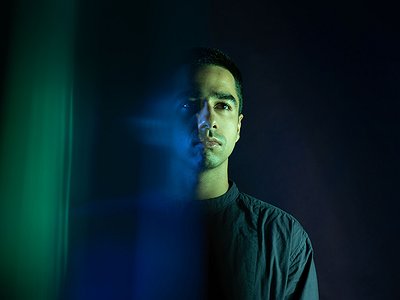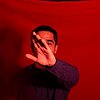Part 1
Name: Vir Rattan Chowdhry aka Vridian
Nationality: Indian
Occupation: Producer, DJ
Current Release: Vridian's Khyber EP is out via Qilla.
Recommendations: Any animated piece by Filmbilder Studios - Love & Theft
Visual Art by E. B. Hudspeth
If you enjoyed this interview with Vridian and would like to know more about his work, visit him on Instagram, Facebook, Soundcloud, and twitter.
When did you start writing/producing/playing music and what or who were your early passions and influences? What was it about music and/or sound that drew you to it?
I was exposed to popular rock music at an early age thanks to my mother and she also tried to get me to learn the tabla when I was around 8 or 9. That didn’t really click and later on, fate led me to the guitar.
I was in awe of bands like AC/DC, Led Zeppelin, Pink Floyd and the likes and at the time I really wanted to do what they did. It was everything - the electric energy, the impact of it and simply the need to make others feel how this made me feel. Beyond my initial inspirations - bands like King Crimson, Porcupine Tree and Radiohead along with musical personalities like Steven Wilson, Mike Oldfield, Thom Yorke, Johnny Greenwood that eventually helped my thoughts about music evolve.
My earliest appreciation for electronic music came through the likes of Robert Miles and Enigma, which my father brought my way - but I was very much against it at the time (yes, just another opinionated guitarist).
I later went to college in Pune in India and we lived close to Goa. It didn’t take much to get on an overnight bus to go experience full moon parties - which at the time, played exceptional goa / psytrance all night. I heard artists like Ajja, Tristan, Raja Ram (Shpongle) for the first time and by the morning I knew I wanted to produce and DJ. The Rest is history!
What has attracted me to music over time has changed through the years, but some common themes are the craft and science of it, the creative and energetic exchange of emotion and the pleasure of sharing it live.
When I listen to music, I see shapes, objects and colors. What happens in your body when you’re listening and how does it influence your approach to creativity?
Before I started making music, it was also a more synaesthetic experience for me. Before I knew the science of it all - it seemed like this ancient magic to which humans shall always be enslaved by. I definitely used to perceive music as visual patterns with movement - and to this day, this perception helps.
Things have changed now and while the learning continues, my brain now automatically shifts into analytical mode. I'm trying to dissect what's happening in the hope of learning something new or perhaps identifying tools that might have been used to create it. I now see music in other things instead - like film, places like the mountains and even special or not so special memories.
Music can still influence my creativity but it mostly it is other real and abstract things - whether an emotion, experience or another medium of art.
How would you describe your development as an artist in terms of interests and challenges, searching for a personal voice, as well as breakthroughs?
Comparatively I am a newer artist - but even then it's been quite a journey. Especially to be doing this in India, where it all began as a niche taste. I have had the privilege of supportive parents, who only suggested I get a formal education before taking any such risks. It inculcated the need for balance to an extent - which is very important for mental peace and creativity as well.
When I first got out there in the search for shows and trying to release music on labels - it was tough to land opportunities. The level of rejection is real and I think this is relevant globally, which is why there should always be a landing pad that helps you support yourself through it. Eventually I worked outside of the scene too and I found that it helped me grow more comfortable personally and gave me the confidence to be myself as an artist. All of this truly reflected in my work and the way I was feeling. It goes a long way.
I appreciate and respect music formulas and to know ‘what works’, but in my case I like to know them to see what I can do differently. I don’t know what led me to think like this but I always have thought about my own work like this.
That being said, I really feel I have more to learn as a person, musician - so I guess in a way I am still searching for that personal voice. Now that I think further, I think my personal voice will continue to change with me!
Tell me a bit about your sense of identity and how it influences both your preferences as a listener and your creativity as an artist, please.
I’ve had a turbulent childhood in more ways than one and at the time I didn’t have the maturity to understand what made me so angry - but I guess the anger issues lead me to classic rock and metal music. Eventually it became progressive rock as the anger subsided (since the turbulent elements also resolved themselves).
This was a time where music was becoming more to me than just expressing my emotion - it was becoming a craft and an eventual way of life. Of course the prog I liked also had this melancholic mood around it - which I guess was the result of a subsided fiery anger.
Once I left for college, it was the age of exploration - within & outward as well. It was about being in new surroundings, having adventures and reveling in a new found independence. This is what led me to dance floors and electronic music. My sense of identity always shifts (I have principles though, that don’t) - so this was the best way to describe how it has shaped my preferences as a listener.
The amalgamation of both of these - the personal journey and growth plus its relationship with what I'm listening to, fuel my creativity as an artist. Which is why there might be a mood to my music, but never a fixed style or genre.
What, would you say, are the key ideas behind your approach to music and art?
In terms of my music - I have always believed in sitting with a blank slate. I like to let the ideas hit as I'm working.
All I know is that I have a starting point. This starting point is different every time I sit to write music. Sometimes it’s a groove, sometimes it’s a chord progression and sometimes it could even be a foley recording. It invokes something different in me each time which I believe contributes to excitement and therefore the creative process.
I have some keywords that I prefer to remember when listening to, and also making my own music. “Attitude'', ‘Emotive’, ‘Boogie’ or 'Groove' are some of them and often I like thinking of my memories of being in the mountains (Himalayas) in various stages of my life. Furthermore, even my experiences as a DJ have helped to understand the floor better as a producer (at least I like to think so, haha).
My approach to any other art is open - and I find myself drawn to pop art because of a lifelong relationship with comics. Even anything that has a hint of that 60s / 70s technicolor vibe - whether it be music, visual art or film - I really have a strong attraction to that aesthetic. I will never not like anything though, but if it doesn’t click then it will simply not keep me interested.
I always believe art is subjective, even if its creation requires craft and technique (that are sometimes objective).
How would you describe your views on topics like originality and innovation versus perfection and timelessness in music? Are you interested in a “music of the future” or “continuing a tradition”?
I truly believe with every fiber of my being that the intention of being original is the base of it all - especially with the alternative sphere of dance music. I also say intention because sometimes, our inspirations play with us sometimes on a very subconscious and unconscious level. Ideas are also floating out there and since there are seven natural notes in music, sometimes one repeats them. Which is why the intention also matters (along with some research, haha).
I feel innovation happens automatically if the artist is connected with themselves. In my case, as mentioned before, I'm always changing. What I feel and think about things changes, my perception and tastes change - so this keeps my ball rolling.
However, yes I believe it's important and I prefer listening to catalogs in which there is a progression and evolution present. Especially those artists that have discographies expanding across decades and I hope to have one just like that myself.
I am anything but a perfectionist so I definitely can't answer that bit and I always strive for a balance between “tradition” and “future”. There will always be things that become a trademark and the tradition helps preserve that, while the future helps make the present more exciting. For me it’s never an “either / or” situation. In any case, the present is always a blend of the past and future.
Over the course of your development, what have been your most important instruments and tools - and what are the most promising strategies for working with them?
Immediate shout out to Ableton Live!!!! I’ve tried using other audio workstations but nothing made it more fun and faster for me than this one.
Even though my journey began with failed experiments on FL Studio, Ableton has been a part of my life now for almost 8 years - which quite possibly makes it the longest love / hate relationship of my life. At different stages there are always learning curves. Every time I thought I knew enough - there’s been another mountain to climb after. It never ends and I'm at peace with that, which is what makes it a lifelong thing!
The first and foremost tool that I'll ever thank is an acoustic guitar (no specific one - have used a bunch over time). Most of my first ideas were born thanks to this instrument and I still use it to this day to work out my own music, since I'm not a very strong keyboard player. I’m also a real fan of my new Antelope Audio interface - it’s really a level up from all the entry level stuff I've used in the past.
Beyond this, my mother is a psychologist and has shared various mechanisms to keep myself mentally sharp and emotionally light. Most of them are from this newer school of study in the field, called Transactional Analysis. It's a tough career to take on in many ways (also rewarding, don’t get me wrong) and the psyche is the most important instrument in every aspect. Figured that this would make a worthy inclusion in this answer as well!






